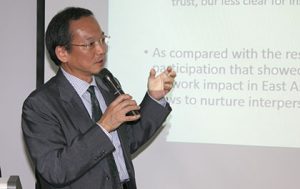
Download
Veranstaltungsort
Deutsches Institut für Japanstudien
Jochi Kioizaka Bldg. 2F
7-1 Kioicho
Chiyoda-ku, Tokyo 102-0094
Japan
Zugang
Anmeldung
Effects of the Hierarchical Nature of Social Networks in Japanese/Asian Context: A Survey Approach
12. Juni 2014 / 18:30 Uhr
Professor Ken’ichi Ikeda, Doshisha University
Asian values have been discussed in relation to cultural practices. Of these values, I would like to emphasize paternalism and harmony orientation (Ikeda, Kobayashi, & Nathan, 2011). These values are meaningful to the extent in which they are reflected in social networks; that is, in East Asia networks are hierarchically structured.
An early study of the effect of these social network properties in Japan (Ikeda & Richey, 2011) revealed that, despite the deficits in Putnamian social capital in social networks (i.e. horizontal networks), positive effects of political discussion networks were found. Political discussion among social network members promotes political participation, enables gains in political knowledge, and increases political tolerance. In this sense, Asian values are not incompatible with fundamental democratic practices. However, some negative effects were detected. The hierarchical nature of social networks often works as pressure to conform without deliberation, although it does not force people to participate in politics unwillingly. This paper will extend the investigation of the effect of social networks in the East Asian context, and focus on moral tolerance as well as personal/institutional trust, both of which are important elements in social capital development.
Ken’ichi Ikeda is Professor in the Department of Media Studies at Doshisha University in Kyoto since April 2013, after 21 years of teaching at the University of Tokyo. He is interested in social/political participation and the mediated effects of social networks on political behaviour. He represents Japan in three international comparative projects, i.e. Asian Barometer Study (ABS), World Values Survey (WVS), and Comparative Study of Electoral Systems (CSES). Among his numerous publications is Social Networks and Japanese Democracy: The Beneficial Impact of Interpersonal Communication in East Asia. (with Sean Richey, 2011, Routledge).